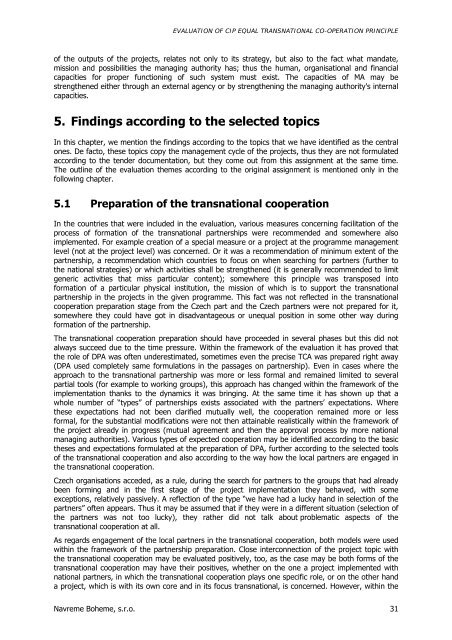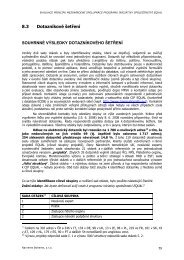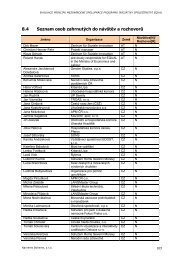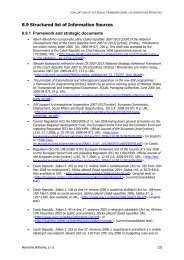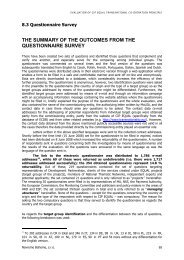EQUAL - Final report - eng - navreme
EQUAL - Final report - eng - navreme
EQUAL - Final report - eng - navreme
Create successful ePaper yourself
Turn your PDF publications into a flip-book with our unique Google optimized e-Paper software.
EVALUATION OF CIP <strong>EQUAL</strong> TRANSNATIONAL CO-OPERATION PRINCIPLE<br />
of the outputs of the projects, relates not only to its strategy, but also to the fact what mandate,<br />
mission and possibilities the managing authority has; thus the human, organisational and financial<br />
capacities for proper functioning of such system must exist. The capacities of MA may be<br />
str<strong>eng</strong>thened either through an external agency or by str<strong>eng</strong>thening the managing authority's internal<br />
capacities.<br />
5. Findings according to the selected topics<br />
In this chapter, we mention the findings according to the topics that we have identified as the central<br />
ones. De facto, these topics copy the management cycle of the projects, thus they are not formulated<br />
according to the tender documentation, but they come out from this assignment at the same time.<br />
The outline of the evaluation themes according to the original assignment is mentioned only in the<br />
following chapter.<br />
5.1 Preparation of the transnational cooperation<br />
In the countries that were included in the evaluation, various measures concerning facilitation of the<br />
process of formation of the transnational partnerships were recommended and somewhere also<br />
implemented. For example creation of a special measure or a project at the programme management<br />
level (not at the project level) was concerned. Or it was a recommendation of minimum extent of the<br />
partnership, a recommendation which countries to focus on when searching for partners (further to<br />
the national strategies) or which activities shall be str<strong>eng</strong>thened (it is generally recommended to limit<br />
generic activities that miss particular content); somewhere this principle was transposed into<br />
formation of a particular physical institution, the mission of which is to support the transnational<br />
partnership in the projects in the given programme. This fact was not reflected in the transnational<br />
cooperation preparation stage from the Czech part and the Czech partners were not prepared for it,<br />
somewhere they could have got in disadvantageous or unequal position in some other way during<br />
formation of the partnership.<br />
The transnational cooperation preparation should have proceeded in several phases but this did not<br />
always succeed due to the time pressure. Within the framework of the evaluation it has proved that<br />
the role of DPA was often underestimated, sometimes even the precise TCA was prepared right away<br />
(DPA used completely same formulations in the passages on partnership). Even in cases where the<br />
approach to the transnational partnership was more or less formal and remained limited to several<br />
partial tools (for example to working groups), this approach has changed within the framework of the<br />
implementation thanks to the dynamics it was bringing. At the same time it has shown up that a<br />
whole number of “types” of partnerships exists associated with the partners’ expectations. Where<br />
these expectations had not been clarified mutually well, the cooperation remained more or less<br />
formal, for the substantial modifications were not then attainable realistically within the framework of<br />
the project already in progress (mutual agreement and then the approval process by more national<br />
managing authorities). Various types of expected cooperation may be identified according to the basic<br />
theses and expectations formulated at the preparation of DPA, further according to the selected tools<br />
of the transnational cooperation and also according to the way how the local partners are <strong>eng</strong>aged in<br />
the transnational cooperation.<br />
Czech organisations acceded, as a rule, during the search for partners to the groups that had already<br />
been forming and in the first stage of the project implementation they behaved, with some<br />
exceptions, relatively passively. A reflection of the type “we have had a lucky hand in selection of the<br />
partners” often appears. Thus it may be assumed that if they were in a different situation (selection of<br />
the partners was not too lucky), they rather did not talk about problematic aspects of the<br />
transnational cooperation at all.<br />
As regards <strong>eng</strong>agement of the local partners in the transnational cooperation, both models were used<br />
within the framework of the partnership preparation. Close interconnection of the project topic with<br />
the transnational cooperation may be evaluated positively, too, as the case may be both forms of the<br />
transnational cooperation may have their positives, whether on the one a project implemented with<br />
national partners, in which the transnational cooperation plays one specific role, or on the other hand<br />
a project, which is with its own core and in its focus transnational, is concerned. However, within the<br />
Navreme Boheme, s.r.o. 31


